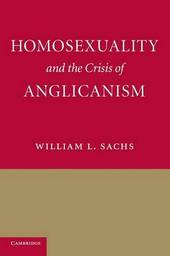
|
Homosexuality and the Crisis of Anglicanism
Paperback / softback
Main Details
| Title |
Homosexuality and the Crisis of Anglicanism
|
| Authors and Contributors |
By (author) William L. Sachs
|
| Physical Properties |
| Format:Paperback / softback | | Pages:268 | | Dimensions(mm): Height 229,Width 152 |
|
| ISBN/Barcode |
9781107639997
|
| Classifications | Dewey:261.835766088283 |
|---|
| Audience | | Postgraduate, Research & Scholarly | | Professional & Vocational | |
|---|
|
Publishing Details |
| Publisher |
Cambridge University Press
|
| Imprint |
Cambridge University Press
|
| Publication Date |
6 March 2014 |
| Publication Country |
United Kingdom
|
Description
The Anglican conflict over homosexuality has drawn worldwide interest and divided the church. However, conflict within Christianity is not new. This book traces the steps by which the crisis emerged, and reveals the deeper debates within the church which underlie both the current controversy and much earlier splits. William L. Sachs contends that the present debate did not begin with opposition to homosexuality or in advocacy of it. He argues that, like past tensions, it originates in the diverging local contexts in which the faith is practised, and their differing interpretations of authority and communion. In the aftermath of colonialism, activists and reformers have taken on prominent roles for and against the status quo. The crisis reveals a Church in search of a new, global consensus about the appropriate forms of belief and mission.
Author Biography
William L. Sachs is Director of the Center for Interfaith Reconciliation at St. Stephen's Episcopal Church, Richmond, Virginia. He is author of Renewing the Ties that Bind (2004), The Transformation of Anglicanism (1993) and Of One Body: Renewal Movements in the Church with Joseph W. Trigg (1986) and over 150 articles.
Reviews'Timely, stimulating, and infused with sociological insight, this book deserves a wide readership.' Theology 'A welter of books have appeared dealing with the last decade or so of angry noise in the Anglican Communion about sexuality, but this one is likely to have more staying power than most ... [the author] does an admirable job ... It would be reassuring to suppose that this last movement of his operetta is as clear-sighted as the rest of a useful and timely analysis.' The Journal of Ecclesiastical History
|